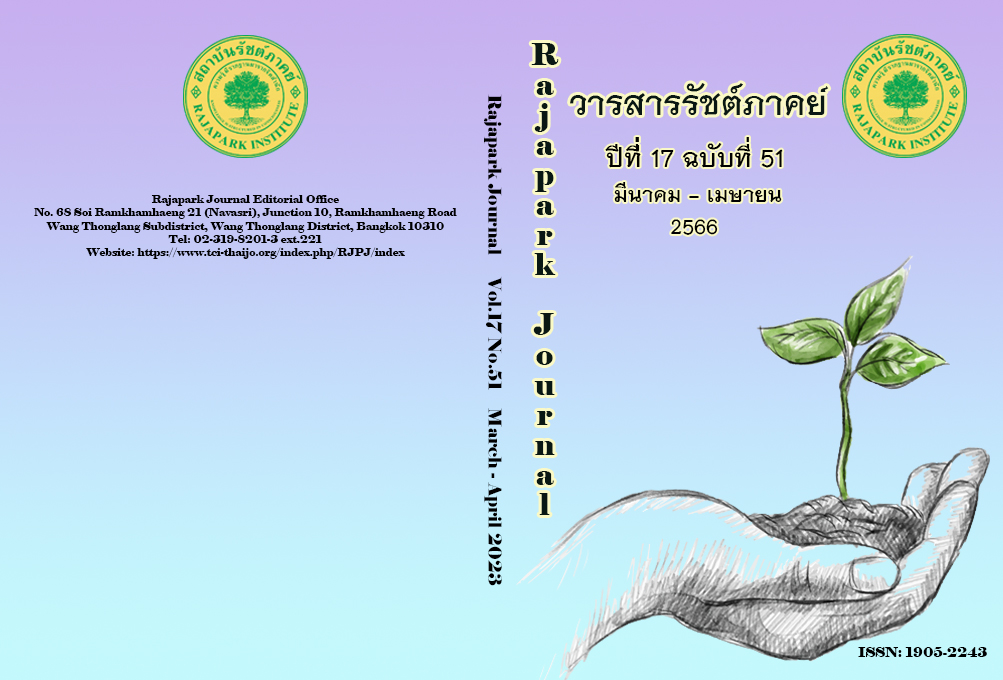The Views of University Supervisors and School Advisors on Pre-service Science Teachers’ Ability to Construct Scientific Explanations of a Rajabhat University in the Northeastern Group
Main Article Content
Abstract
This research aimed to study the views of university supervisors and school advisors on pre-service science teachers' ability to construct scientific explanations at a Rajabhat University in the Northeastern Group. This research employed a qualitative research methodology using interpretative phenomenology based on Heidegger. The key informants were 8 university supervisors and school advisors with 7-9 years of experience in teaching science and supervising pre-service science teachers using purposive selection. The data were collected through in-depth interviews using a semi-structured interview protocol. The data were analyzed based on Leonard's process. The credibility of the data was verified using the triangulation method. The findings revealed the views of university supervisors and school advisors based on their experiences that pre-service science teachers could construct scientific explanations composed of three components, which were claim, evidence, and reasoning, in the form of short sentences that were not completely connected. The pre-service science teachers could identify the correct claim according to the scientific concepts if it is the concept that they are learning or have recently learned. They obtained evidence from the inquiry process through experiments and searching for information related to the claim, but it was insufficient, resulting in incomplete reasoning. Inquiry-based learning, hands-on activities, practicing to present the experimental results, and summarizing the scientific concept more often could help to promote pre-service science teachers' ability to construct scientific explanations.
Article Details

This work is licensed under a Creative Commons Attribution-NonCommercial-NoDerivatives 4.0 International License.
Views and opinions appearing in the Journal it is the responsibility of the author of the article, and does not constitute the view and responsibility of the editorial team.
References
Amelia, R., Rofiki, I., Tortop, H., & Abah, J. (2020). Pre-service Teachers’ Scientific Explanation with e-scaffolding in Blended Learning. Journal Ilmiah Pendidikan Fisika Al-BiRuNi, 9(1), 33-40.
Becker, E. R. (2014). Explicit Instruction of Scientific Explanation and Argument in an Undergraduate Introductory Biology Laboratory Course Using the Claim, Evidence and Reasoning Framework. Louisiana State University and Agricultural and Mechanical College, Louisiana.
Berland, L. K. (2008). Understanding the Composite Practice that Forms When Classrooms Take Up the Practice of Scientific Argumentation. Northwestern University, Evanston.
Chaowakeratipong, N. (2019). Enhancing the Ability in Constructing Scientific Explanations of Learners by Using the Inquiry Teaching Method. STOU Education Journal, 12(1), 40-54.
Chumsaeng, T., Jantarakantee, E., & Chiangga, S. (2017). The Development of Grade 10 students’ Scientific Explanation Ability in Equilibrium Unit Using Context-Based Approach. https://gsbooks.gs.kku.ac.th/60/nigrc2017/pdf/HMO5
Gotwals, A. W., & Songer, N. B. (2012). Assessing Students’ Progressing Abilities To Construct Scientific Explanations. https://www.researchgate.net/publication/290096018.
Gilmanshina, S. I., Gilmanshin, I. R., & Sagitova, R. N. (2016). The Feature of Scientific Explanation in the Teaching of Chemistry in the Environment of New Information of School Students’ Developmental Education. International Journal of Environmental & Science Education, 11(4), 349-358.
Hadkhuntod, P. (2018). The Effects of Inquiry Learning Management (5Es) Emphasizing Provision of Scientific Explanation on Science Learning Achievement in the Topic of Weather and Scientific Explanation Creation of Matthayom Suksa I Students at Nawamintrachinuthit Suan Kularb Wittayalai Pathum Thani School in Pathum Thani Province. Journal of Kasetsart Educational Review, 35(1), 35-47.
Heidegger, M. (1962). Being and time. In J. Macquarrie, & E. Robinson, (Translator). Harper & Row.
Independent Committee for Education Reform (ICER). (2019). Education Reform Country Plan. Office of the Education Council: ONEC.
Kamtet, W. (2020). Scientific Explanation Ability Assessment Based on Context-Rich Problems for Biology Student Teachers. Journal of Education, Prince of Songkla University, Pattani Campus, 31(3), 45-59.
Kedcham, A., & Sitthisopasakul, T. (2022). Test of Gender Invariance of the Test Anxiety Scale among Secondary School Student. Journal of Institute of Trainer Monk Development, 5(4), 11-23.
Leonard, V. W., (1989). A Heideggerian Phenomeno- logic perspective on the concept of the Person. Advances in Nursing Science, 9, 40-55.
Lertdechapat, K., & Promratana, L, P. (2018). Effects of Collaborative Inquiry on Ability in the Scientific Explanation Making of Lower Secondary School Students. Journal of Education Studies, 46(2), 1-20.
McNeill, K. L., & Krajcik, J. (2006). Supporting Students’ Construction of Scientific Explanation Through Generic Versus Context-Specific Written Scaffolds. https://www.researchgate.net/publication/228850868_Supporting_students%27
McNeill, K. L., & Krajcik, J. (2008). Scientific Explanations: Characterizing and Evaluating the Effects of Teachers’ Instructional Practices on Student Learning. Journal of Research in Science Teaching, 45(1), 53-78.
Meela, P., & Artdej, R. (2017). Model-based Inquiry and Scientific Explanation: Promoting Meaning-making in Classroom. Journal of Education Naresuan University, 19(3), 1-15.
Molefe, P., & Khwanda, M. N. (2019). An Evaluation of the Impact of Scientific Explanation Model on Pre-service Teachers’ Understanding of Basic Concepts in Electricity. The South African Institute of Physics, 64, 221-226.
Nuansrijun, T. (2017). Interpretative Phenomenological Analysis: A Qualitative Methodology for Psychological Research. Journal of Education, 28(3), 1-13.
Organization for Economic Co-operation and Development (OECD). (2013). Education at a Glance 2013. OECD Indicators.
Saxton, E., & Hoffenberg, R. (2015). Scientific Explanations: A Comparative Case Study of Teacher Practice and Student Performance. Electronic Journal of Science Education, 19(5), 1-39.
The Institute for the Promotion of Teaching Science and Technology (IPST). (2020). Scientific Literacy. https://pisathailand.ipst.ac.th/about-pisa/scientific-literacy/.
Yao, J. X., Guo, Y. Y., & Neumann, K. (2016). Towards a Hypothetical Learning Progression of Scientific Explanation. Asia-Pacific Science Education, 2(4), 1-17.


